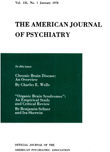The New Soviet Approach to the Unconscious
Abstract
Soviet investigators have moved from criticism of psychoanalytic concepts to development of a theory of the unconscious that represents the convergence of set theory, neurophysiology, and cybernetics. One accepted Soviet definition of the unconscious is the continuous processing of information and the regulation of adaptive behavior through the formation of sets. Consciousness operates intermittently, when a problem must be solved by objectivization, with a change in sets. Conscious and unconscious processes act synergistically, not antagonistically, as Freud suggested. Dissociation, psychosomatic relationships, and psychotherapy are briefly discussed to illustrate the Soviet approach to the unconscious in psychiatry.
Access content
To read the fulltext, please use one of the options below to sign in or purchase access.- Personal login
- Institutional Login
- Sign in via OpenAthens
- Register for access
-
Please login/register if you wish to pair your device and check access availability.
Not a subscriber?
PsychiatryOnline subscription options offer access to the DSM-5 library, books, journals, CME, and patient resources. This all-in-one virtual library provides psychiatrists and mental health professionals with key resources for diagnosis, treatment, research, and professional development.
Need more help? PsychiatryOnline Customer Service may be reached by emailing [email protected] or by calling 800-368-5777 (in the U.S.) or 703-907-7322 (outside the U.S.).



